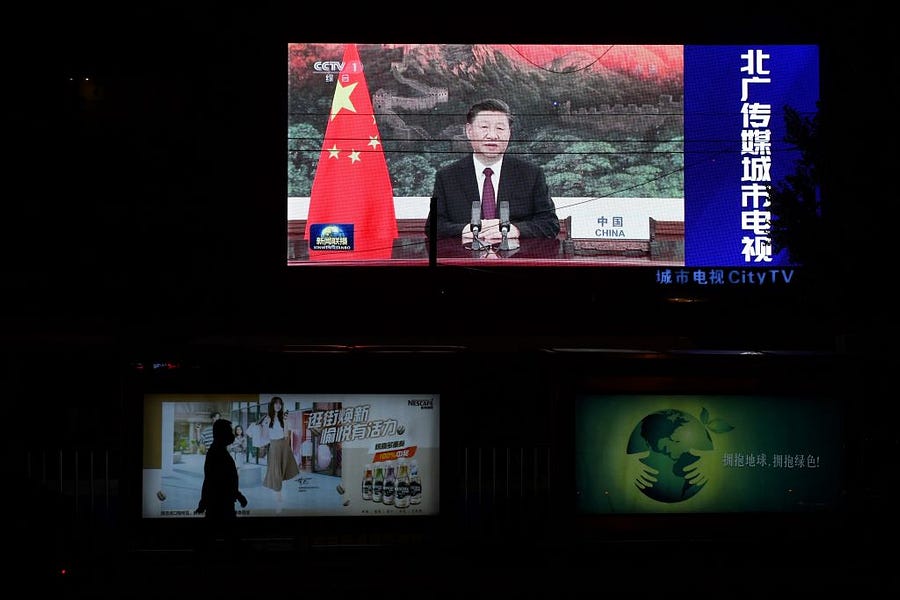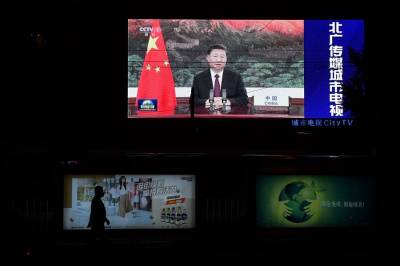President Trump and China’s Xi Jinping clashed at the United Nations this week, each using rhetoric that reflected their opposing worldviews in recorded speeches. Trump delivered a direct indictment of the Chinese Communist Party (CCP). Throughout his speech, which was framed around the “China virus” and the CCP’s mishandling of the outbreak, the president assailed China’s “rampant pollution,” overfishing, and “trade abuses.” He demanded that the United Nations hold China “accountable” for its false declarations concerning the virus’s transmissibility and its pattern of obfuscation.
Xi was more circumspect, but his intended target was no less obvious. Though he did not mention the United States by name, Xi portrayed America as a unilateral power that is uninterested in cooperating with other nations. While there is little doubt that Xi intended to rebuke President Trump’s “America First” agenda, his arguments were entirely deceptive. Let us examine Xi’s rhetoric.
It is striking how much Xi, the leader of an authoritarian party, has co-opted the language of Western liberalism. The second to last line in his speech was this: “Let us join hands to uphold the values of peace, development, equity, justice, democracy, and freedom shared by all of us and build a new type of international relations and a community with a shared future for mankind.” Of course, Xi does not believe in “justice, democracy, and freedom,” at least not in any form that most Americans would recognize. Why, then, does he employ these words? He knows what sounds good on the international stage.
Indeed, Xi’s speech was peppered with phrases that sound like a progressive American was speaking. Consider his use of the phrase “interconnected global village.” Those words were uttered in the context of combating COVID-19. Xi wants to turn the pandemic narrative around, portraying his China as a responsible global leader in combating the virus. But there is additional context for his wording.
The CCP uses international institutions such as the U.N. to protect its own tyranny. When Xi speaks of “democracy” and “multilateralism,” he means China should have at least an equal say in how those same institutions are run. A key tell can be found in these seemingly benign sentences from Xi’s speech:
We should see each other as members of the same big family, pursue win-win cooperation, and rise above ideological disputes and do not fall into the trap of "clash of civilizations." More importantly, we should respect a country's independent choice of development path and model. The world is diverse in nature, and we should turn this diversity into a constant source of inspiration driving human advancement.
Xi’s “diversity” leads to an equivalency between Western democracy and Chinese autocracy. The world “should respect” China’s decision to live under a totalitarian regime, Xi is arguing, and not fall into a “clash of civilizations.” He implies that America and its allies--not China--are the ones choosing to make this a civilizational conflict. At a moment when the West is deeply ambivalent about its own civilization, Xi’s claim doesn’t ring true. Although some in American policymaking circles have (at times) viewed it as a civilizational struggle, this is not really the president’s perspective. Trump stated his own view before the U.N., saying that he is “proudly putting America first, just as you should be putting your countries first.” Trump emphasized: “That’s okay—that’s what you should be doing.”
Which brings us to the central difference between Trump’s and Xi’s views. Whereas the president has a transactional approach to foreign affairs, Xi’s motives are driven by civilizational concerns. One gets the sense that if the economic ties between the two countries could be recalibrated to Trump’s liking, then the president probably would not be overly concerned with other issues. Trump did not offer a vision for how international institutions should work, or what their goals should be.
Xi, on the other hand, offered a full-throated defense of these organizations. Xi’s defense of the World Trade Organization (WTO), World Health Organization, and the U.N. isn’t rooted in altruism. He sees these institutions as useful vehicles for furthering the CCP’s agenda.
Xi argued that nations should “remain committed to building an open world economy, and uphold the multilateral trading regime with the World Trade Organization as the cornerstone.” The Chinese leader then added: “We should say no to unilateralism and protectionism, and work to ensure the stable and smooth functioning of global industrial and supply chains.”
This was undoubtedly intended as a critique of some of Trump’s protectionist tendencies. However, Xi’s endorsement of the WTO was self-serving. It is well-established that the CCP continued its nefarious practices long after its admittance into the WTO in 2001. These behaviors include: intellectual property theft, state-directed cyber intrusions, forced technology transfers and domestic market protectionism. And Xi’s notion of an “open world economy” does not mean unfettered competition between global firms. Instead, the CCP is using initiatives such as “Made in China 2025” (MIC 2025) to bolster domestic firms at the expense of foreign competition. As the U.S. Chamber of Commerce reported, “MIC 2025 illustrates the state’s intent to leverage China’s legal and regulatory systems to favour domestic Chinese companies over foreign ones in targeted sectors.”
Trump dismissed the WHO as being “virtually controlled by China.” In direct contrast, Xi stood by the WHO, even proclaiming that it should play “the leading role” in responding to the coronavirus. The Trump administration proclaimed months ago that it was withdrawing American funding from the WHO, which is riddled with problems, so the president’s remark is unsurprising. But the discrepancy between the two sides again points to China’s desire to use international institutions to garner more influence.
And then there is the U.N. itself. “We should stay true to multilateralism and safeguard the international system with the U.N. at its core,” Xi declared. The CCP man said that while the “global governance system” needs “reform and improvement,” it “should be based on the principle of extensive consultation, joint cooperation, and shared benefits so as to ensure that all countries enjoy equal rights and opportunities and follow the same rules.”
Does anyone really think that Xi is committed to following the “same rules” as Western nations? History tells us the opposite. Xi and the CCP seek to remake the U.N. in China’s image.
The U.S. is at a crossroads when it comes to the so-called international order. China is using global institutions to advance its interests. The Trump administration is right to cry foul—but a real plan for reformation is still needed.
Photograph by Greg Baker/AFP/Getty Images.






Please note that we at The Dispatch hold ourselves, our work, and our commenters to a higher standard than other places on the internet. We welcome comments that foster genuine debate or discussion—including comments critical of us or our work—but responses that include ad hominem attacks on fellow Dispatch members or are intended to stoke fear and anger may be moderated.
With your membership, you only have the ability to comment on The Morning Dispatch articles. Consider upgrading to join the conversation everywhere.